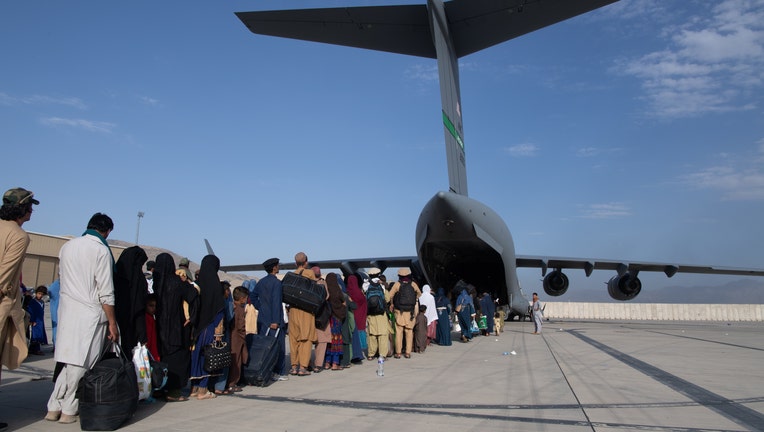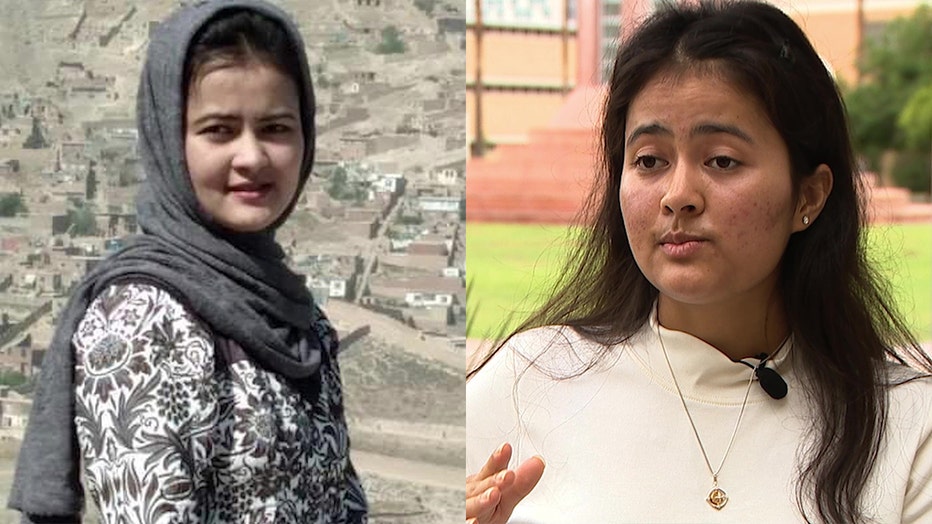Afghanistan refugee talks about her new life in Arizona

People board a U.S. Air Force C-17 Globemaster III at Hamid Karzai International Airport in Kabul, Afghanistan. (U.S. Air Force photo by Master Sgt. Donald R. Allen)
PHOENIX - August marks the one-year anniversary of American withdrawal from Afghanistan, and since then, the country has spiraled, as many feared, and it is now in a deep humanitarian crisis.
As a result of the turmoil, thousands of Afghans have fled from the country, and many of them re-settled in Arizona.
One of the refugees who re-settled in Arizona is Fahima Sultani.

Fahima Sultani
"I thought the whole world collapsed on my head, when I got to know that the Taliban took control in Afghanistan," said Sultani, who is now a student at Arizona State University.
Sultani was born in 2001. Growing up in Afghanistan, she never lived under the Taliban regime, but always feared the stories her parents told her. Those fears turned to reality as the Taliban took control, and word spread that American and NATO troops were leaving the country.
Sultani said she knew she had to get out, and fast.
"I was thinking if they kill me, let them do this because if I stay in Afghanistan, I will be kind of a dead body because I cannot speak," said Sultani. "Millions of girls right now, they don’t have the right to speak. They don’t have the right to live freely, to make decisions for themselves. So I thought that I will make it, or otherwise if they kill me, let them do this."
Sultani left her family behind to start the dangerous journey to America. Like hundreds of others, she spent days trying to get into Kabul's airport.
"The third day that we were trying to get into the airport, an explosion happened," Sultani recounted. "A lot of fighting’s happened. Gunfighting and gunshots happened, and a lot of people got killed from our group. We were seven buses, and several girls just gave up. They were so frightened and afraid."
Eventually, Sultani made it onto a plane to Washington D.C.. From there, she went on to a military base in Wisconsin, where she stayed for three months. That was when ASU found her. They welcomed Sultani, along with 63 other students from Afghanistan.
"It's like heaven for me," said Sultani. "I have a lot of opportunities as a student, as a girl, as a human. I have a lot of opportunities. I can be myself, I can dress the way I want to, I can go wherever I want, anytime, without a man or a male surrounding me."
Currently in Afghanistan, nearly 20 million people are facing tremendous danger and starvation as the country falls into a dire economic crisis. Meanwhile, the Taliban continues to carry out targeted attacks, and place harsh restrictions on women and minorities.
"We were following the news, as was everyone else, and realizing that we were going to have to mobilize quickly for people that were really coming out of harm's way straight away," said Aaron Rippenkroeger, Executive Director of the International Rescue Committee in Arizona.
The International Rescue Committee responds in times of crisis by helping resettle refugees into the United States. Over six months, they welcomed 775 Afghan refugees to the Phoenix area.
"Many of the folks that came were really highly skilled,"said Rippenkroeger. "Doctors, engineers, pilots, you name it. People now into their long-term situations, so they’re in a home. They are paying their rent. Yhey are employed for the most part. Their kids are in school, and like I said, many of them were fluent in English before they got here."
Now, Sultani is studying business administration and entrepreneurship. She also helps international students on campus, but her biggest dream is to create her own non-profit, helping women and children back in Afghanistan.
"I can work, I can do my studies, I can even dream bigger than before," said Sultani. "I can work on my potential to be stronger than ever."
ASU for Refugees
https://asuforrefugees.asu.edu/
International Rescue Committee
https://www.rescue.org/who-we-are

(Related Video) 60 refugee women from Afghanistan taking classes at ASU
Thousands of refugees fled Afghanistan late last year when the U.S. officially ended its military mission in the country, and now, some of them are in Arizona and enrolled at Arizona State University. FOX 10's Danielle Miller reports.

